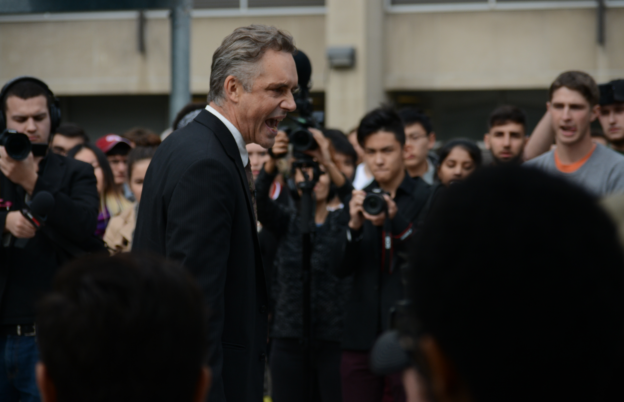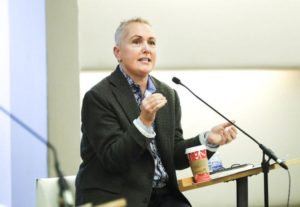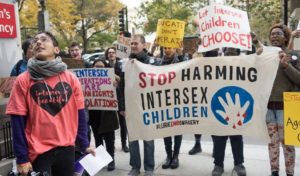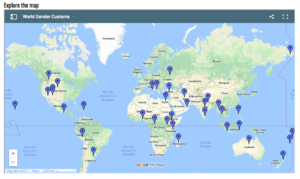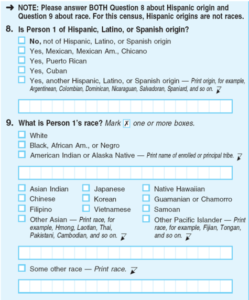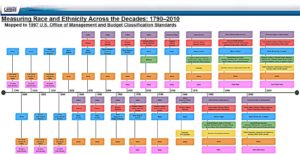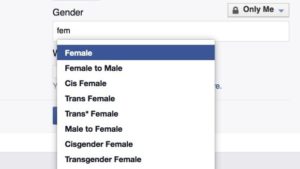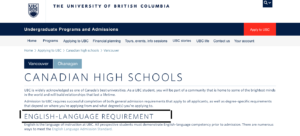Last Friday, November 3rd, the UBC Free Speech Club hosted University of Toronto’s Professor of Psychology, Dr. Jordan Peterson, to speak at the Telus Studio Theatre located in UBC’s Chan Centre. With a description stating, “Come and spend your evening with Dr. Peterson, and find out what the future holds for free speech, and western civilization” we feel the pressing need to comment on his politics around free speech. Dr. Peterson also was an invited speaker on November 4th at the Vancouver Convention Centre for an event organized by “Students for Liberty BC”.
In 2016, Dr. Peterson became a controversial figure for popularizing the notion that no one should be compelled to use gender-affirming pronouns for trans people if they did not see such pronouns as legitimate. In a series of YouTube videos released in late 2016 and early 2017, he critiqued Bill C-16, which sought to add protections against discrimination on the basis of “gender identity and gender expression” to Canada’s Federal Human Rights Act and Criminal Code. The bill passed on June 15th of this year in midst of Jordan Peterson’s dire attempt to precipitate fear mongering.
Mary Bryson speaks at the panel at U of T. Photo via WikiCommons
On November 19th, 2016 Dr. Peterson engaged in a debate with UBC’s Dr. Mary Bryson, Senior Associate Dean and Professor in the Faculty of Education, who is gender nonbinary and uses the pronouns “they/them.” This debate occurred ironically just a day before the International Transgender Day of Remembrance, which memorializes trans people who have been murdered due to hatred of their gender identity. The debate was organized by U of T, and throughout the debate, which covered the issue of academic freedom in relation to the use of gender-affirming pronouns, Peterson repeatedly misgendered Dr. Bryson, referring to them as “she” and “her.” In the wake of the debate, Bryson informed the Ubyssey that they had received large amounts of hate mail and violent threats via email and social media from people who took issue with their gender expression and viewpoints.
In 2016, “post-truth” became the Oxford Dictionary’s word of the year, “an adjective defined as relating to or denoting circumstances in which objective facts are less influential in shaping public opinion than appeals to emotion and personal belief.” Here, the “post” of post-truth refers to “belonging to a time in which the specified concept [in this case, the truth] has become unimportant or irrelevant.” Are we living in a post-truth political climate surrounding the gendered pronoun debate? Are we living in a time in which the UBC community is complicit in allowing someone the freedom of speech to preach factually-inaccurate information concerning gender under the pretense of academic integrity and rigour? Would it be audacious of us to state that refusing to acknowledge the gender identities of nonbinary people requires deliberate ignorance of facts and research that suggest that the use of nonbinary pronouns is indeed logical?
Dare we also say, at the same time, that we respect Dr. Peterson’s effort to engage in an important dialogue around freedom of speech?
We would like to be clear that the concerns he has about freedom of speech are evidently shared among many in our current culture and society, including ourselves. Over the past year having met with, listened to, and engaged in amicable conversations with people who are concerned that their freedom of speech is being limited for the sake of political correctness, there is something to be said about addressing this common issue. At the University of Toronto forum in which Dr. Peterson debated with Dr. Bryson and Dr. Brenda Cossman, a Law Professor & Director at the Mark S. Bonham Centre for Sexual Diversity Studies, Dr. Peterson stated the following:
I’m going to read you something a graduate student sent me from the University of Toronto the other day and I can also tell you that I’ve received hundreds of letters like this: “Today I had a tutorial at the University of Toronto where I talked about Jordan Peterson and issues of personal identity, legally sanctioned categories etc…still students were not engaging in discussion. I asked them why. One said it was because she was worried to share her opinion for fear of being singled out or saying something offensive. I asked who else was not speaking for that reason. The whole class put their hands up.”
We too share the concern of some of the students and professors who feel too afraid to engage in intellectual discussion on campuses out of fear that their peers will aggressively reprimand them. No one should be called out or humiliated if they have a genuine interest in learning. With that being said, at a high-ranking university like UBC, students and professors are also expected to ground their discussions in academically rigorous facts. This is where we depart from Dr. Peterson and his acolytes: they lack any factual evidence that is persuasive enough to convince us that gender nonbinary people do not exist and therefore should not have their rights entrenched in law. Trans people have the right to be referred to by the pronouns they feel best affirm and respect their gender.
We have listened to Dr. Peterson’s arguments, and like most people, we do see some legitimacy in them. We admit he is eloquent and persuasive, if even for the wrong reasons. Is there some legitimacy in what he brings up about free speech and a culture of polarization that we too are concerned about? Absolutely. But what Peterson is using his “free speech” towards is the suppression of minority rights that he takes ideological issue with. We don’t support such “intellectual” thinking, or argument. He is responsible for the ideas that he shares as a public figure, and even more so as an academic. Being an intellectual and academic in the public eye carries the weight of appearing to have come to persuasive conclusions by way of academic rigour, regardless of whether or not that is the case.
With that being said, the issue of political correctness, especially around one’s usage of gender pronouns, is one that requires critical analysis. Let us present to you five arguments as to why respecting and affirming the genders of nonbinary people is a valid request.
1) The physical construction of the gender binary through imposing “corrective surgeries” on intersex babies at birth.
Protesters outside the Lurie Children’s Hospital in Chicago, Oct. 26. | Courtesy of Sarah-ji Rhee / Love and Struggle Photos
If we are to take a biologically deterministic approach here, that is, one that argues that there are only two sexes, and therefore only two genders, we encounter a scientific flaw in this argument. What gender pronouns should a parent use to refer to their intersex baby by if biologically this baby is neither categorically male or female? What often happens is that doctors surgically alter the genitalia of newborns, henceforth, constructing sex in alignment to the ideological belief that there are or should be only two genders (and by extension, sexes). The results of this practice have been described as “catastrophic”, often leading to “irreversible physical harm and emotional distress” in intersex individuals who have gone through coercive gender assignment surgery.
Intersex people, individuals who do not have either XX or XY chromosomes, or who present other physiological and genetic differentiations from the male vs. female sex binary, make up as much as 1.7% of the population. About 1 in 60 people, then, differ from the “platonic ideal of absolute sex chromosome, gonadal, genital, and hormonal dimorphism” .
So even by Dr. Peterson’s standards, there is a very real rift in the sex binary of “male” and “female”. What is interesting, however, is that Dr. Peterson himself has acknowledged this. Though it is difficult to find much of his opinion on the matter, he tweeted an article on intersex people with the comment, “Genuine complexity in sexual identity”.
Notwithstanding his insistence upon the existence of “genuine” innate genders and sexual identities, Dr. Peterson appears to acknowledge this rift in the sexual binary. He does not, however, comment any further on the potential use of gender-affirming pronouns for intersex people, although, by his own standards, a comment seems warranted. The ratio of intersex infants who are subjected to gender assignment surgery to the remainder of infants born who do not undergo such surgery, is estimated at being between 1 in 1500 and 1 in 2000 people, and so this leads us to wonder if he declined to comment because the argumentative shift is one from the topic of statistical commonality and validity, an argument that he so often invokes, to one about physical versus psychological validity.
2) The existence of multiple genders in many Indigenous communities as well as communities beyond North America and Great Britain.
A common myth surrounding nonbinary genders is that they have only come into existence rather recently, either within the last decade or so, as part of the rise of internet social justice culture and the microblogging platform Tumblr, or at some point within the latter portion of the twentieth century as a result of feminist movements.
This simply isn’t true, as there are multiple examples to be found across the globe and throughout history where some form of a third gender (if not more), has been recognized. A “third gender” is a gender outside of the binary of “women” and “men,” a binary which also notably differs greatly across cultures in terms of how it is defined and entrenched. Examples of third-gender cultural roles include Hijras in India, Kathoey in Thailand and Mahu in Hawaiian and Tahitian cultures.
However, a cultural group outside the gender binary that is perhaps more pertinent to what most people now call “Canada” are Two-Spirit people, belonging to various Indigenous cultures here, on the land they know as Turtle Island. Colonial accounts of Nēhiyaw (Cree), Lakȟóta (Lakota), Diné (Navajo), and Ojibwe peoples show that these nations recognized nonbinary genders, dating back hundreds of years in the settler archive (although scholars and Indigenous knowledge verify that this recognition of two-spirit people existed well before the colonial era).
Map of Gender-Diverse Cultures (Source: PBS)
The implications of this become more pressing when we consider the imposition of a western-European gender binary on lands that not only existed and were owned and occupied prior to our current culture’s tenure here, but lands that in many case were taken under false pretences, and ceded due to deception, if they were willingly ceded at all.
Furthermore: what do land acknowledgments mean if we allow ourselves as settlers to impose a gender binary on all people living here, a gender binary that did not exist in this place prior to the arrival of settler culture amongst local Indigenous communities?
In any case, this essentially discounts any attempts at de-legitimizing nonbinary genders by describing them as some recent, trendy, or adolescent phenomenon, and it leads into our third argument:
3) Gender is different from biological sex.
We define gender as one’s personal sense of their own gender, which may differ or correlate with the one assigned at birth. Though the ways in which one’s gender identity is embodied is culturally mediated, guided, and often bounded by the norms and values of particular societies or cultures, each individual within society develops a personal identity in relation to one or more of any number of gender identity categories that may exist within their culture. They may identify with gendered roles to varying degrees, or not identify as belonging to any gendered category at all.
Beyond this, gender is often performative, and people understand and mediate both their own gender identities and the identities of other people within their culture and community by paying attention to behaviour, to the way they or others dress, and to the relationships that exist between individuals. Gender is constantly constructed and deconstructed by the ways in which people engage with one another, affirming or rejecting each other’s gender identities and performances.
Whether it’s in the field of history, humanities, anthropology, or sociology, there is plenty of academic literature to support the argument that gender is socially constructed, while sex, is biological (though sex is still not precisely binary, as we discussed above). Additionally, in the field of medicine, or even in Dr. Peterson’s own field of psychology the differences between gender and sex have been proven to be tangibly relevant, despite the common argument that distinguishing gender from sex, on identification documents, for example, would be medically irrelevant or even simply confusing. It is true that transgender, nonbinary, and/or intersex individuals make up only a small percentage of the population, but not only is this not an appropriate basis for being disrespectful or explicitly harmful towards them, Dr. Peterson himself has been willing to admit that intersex people, being a very small minority as well, are worth considering with respect to examining the binary of sexual identity, if not for engaging with its consequences.
Gender & Sex (Source: Canadian Institutes of Health Research)
The fact that society too often conflates sex with gender leads to discrimination against trans people, structurally, culturally, and personally. So much of this discussion around protecting trans and especially nonbinary people is rooted in the ethical responsibility we hold to prevent violence that targets trans people. According to a 2013 American survey from 6450 trans respondents, 78% had experienced harassment, 35% physical assault, and 12% sexual assault.
For many people who are gender nonbinary, their own identities, interests, behaviours, or stories go beyond the existing binary of men and women. In Gender Failure, a montage of personal stories by two nonbinary authors, Rae Spoon and Ivan Coyote, the difficult reality they experienced engaging with the gender binary and its expectations and entanglements is explored. Appropriate to the title, both Spoon and Coyote argue that “it’s the binary that fails to leave room for most people to write their own gender stories.”
Gender identities do not arbitrarily arise from out of nowhere – both Spoon and Coyote describe how their gender identity and use of the pronoun “they” is reflexive of their failure to appease the rigid expectations associated in male and female gender roles. In view of the argument put forth in Gender Failure that using the pronoun “they” is rooted in a marginalized experience from the roles associated with the gender binary, Dr. Peterson’s logic that nonbinary identities are illegitimate because gender is inextricable from biology is open to heavy criticism.
4) Racial and Gender Categories have historically been socially constructed.
Racial Categories in the 2010 American Census
“Historical Census Statistics on Population By Race, 1790 to 1990, and By Hispanic Origin, 1790 to 1990, For The United States, Regions, Divisions, and States.” (Source: United States Census Bureau)
For multiracial individuals, including one of the authors of this article, calling someone by their multiracial identity could also be dismissed by racists who would invoke a compelled speech discourse. For some people who might refer to themselves, for example, as a biracial Chinese/British Canadian in terms of racial identity, one cannot help but draw parallels to the emergence of racial categories to gender categories over time. This parallel exists because racial and gender categories are social constructs. In fact, only until the year 2000 could Americans choose more than one race on the national census, and only until 2010 were 63 racial categories available. The first American census in 1790 had only three racial categories: “Free Whites, All Other Free Persons, and Slaves”.
Much like the optional racial categories that shift over time, so too can gender categories. In 2015, Facebook gave users the option to select from 58 different gender identity options, and if none of those fit, they gave a final option: fill in the blank. From 63+ racial categories to 58+ gender categories, a noticeable pattern emerges. Identities shift across time and cultures, and to resist calling someone by their chosen “they/them” pronouns is deliberately shoehorning a multiracial person into a nonrepresentative and simplified racial category.
Possible Gender Options on Facebook (Source: Facebook)
5) Compelled speech is already taken for granted in Canadian culture.
Dr. Peterson’s argument then comes down to the issue of free speech, particularly the notion that calling a nonbinary person by their pronouns is “compelled speech.” But we can find plenty of examples in society where we are “compelled” to speak in a certain way.
For example: An argument can be made that respecting pronouns is synonymous with respecting someone’s name, whether their name is familiar to someone in a particular cultural setting or not. To claim that one has the “right” or “freedom from compelled speech” to address someone by a gender-negating pronoun is equivalent to not recognizing the legitimacy of an ethnic name we aren’t familiar with (lest we again consider the implications of denying this to Indigenous people and many of their names). Consider how ludicrous and inappropriate it would be for a professor to say to a student “You can’t force me to call you Li Wei because I don’t recognize that as a legitimate name; I am going to call you Bob.” Respecting a person’s name is similar to respecting their pronouns.
Furthermore, those who state they should resist “compelled” speech around pronouns conveniently ignore how they are compelled to behave and speak in certain ways on a daily basis. At UBC, for example, a student is required to write their papers and exams in English. There is no denying this is a form of compelled speech. At UBC, students are compelled to complete assignments by a set deadline. This is a form of compelled action.In Canada, under section 32 of the Official Languages Act “all federal institutions are required to provide services in both official languages” of French and English. This is again a form of compelled speech. We are also required to wear clothing to prevent nudity in most public spaces under section 173 of the Canadian Criminal Code. This is also a form of compelled action. Cisgender women are also socially prohibited from revealing their breasts in public, which is also a compelled action. Lastly, the selling of tobacco products in Canada are required to explicitly state health warning under the Tobacco Act. Again, this is a form of compelled speech. With pronouns, this therefore comes down to the question of whether or not “they/them” pronouns are legitimate. Let us take a moment to reflect on a reality that will surely spark controversy: referring to people only in the binary of male and female pronouns is in fact compelled speech because this forces people to disregard the factual spectrum of gender. The argument that one should not refer to someone who requests “they/them” pronouns under this notion of “compelled speech” is merely a rhetorical strategy that lacks critical thinking.
UBC’s English-Language Requirement
It’s not hard to effectively draw a somewhat explicit, if not more insidious, parallel between intentionally and repeatedly calling someone by pronouns other than their own, and using more explicit racial, sexual, or homophobic slurs to actively make a mockery of someone’s social identity by using said slurs (given that it is the social and historical context of language that is used to determine what constitutes a “slur” in the first place). Since the defense of “compelled speech” does not typically defend against refusing to call someone by something other than a homophobic, racial, or gendered slur, nor should it be a defense for insisting upon referring to trans and/or nonbinary people by pronouns that aren’t their own.
However, the case could also be made that enforcing said potential slurs in a legal context could become very tricky. Thankfully, contrary to Peterson’s belief, we generally don’t have to concern ourselves with the legality of enforcing it as a slur.
What is Bill C-16?
Beyond “self-censorship’’ and “safe spaces,” Peterson’s most pressing concern seems to be with the passing of Bill C-16, now law, as an amendment to the Canadian Human Rights Act and Criminal Code, which adds “gender identity or expression” to the currently prohibited grounds of discrimination and hate propaganda.
But C-16 refers only to hate propaganda (commonly referred to as “hate speech”) which strictly refers to advocating genocide, and discriminatory practises which apply the provision of goods and services, employer-employee relations, and federally provided services. The former Section 13 of the Canadian Human Rights Act regarding what was categorized as hate messages was repealed in 2013. So no one will likely ever be taken to trial for intentionally and repeatedly refusing to refer to someone by their pronouns unless they are causing undue hardship to an employee, discriminating in the provision of goods or services, or criminally harassing someone, in which one is deemed to reasonably fear for their life and safety, a relatively high standard to be met.
Dr. Peterson also commonly cites the Ontario Human Rights Commission, which is more explicit about misgendering as being a form of of harassment and discrimination, but again, this only becomes a case for the OHRC when it falls under a “social area covered by the code,” one similar to that of the CHRA, including contracts, employment, goods and services, housing, and membership in vocational associations and trade unions.
Therefore, the “compelled speech argument” Dr. Peterson so strongly relies upon, is strictly a social one, with no legal ramifications extant for failing to respect someone’s pronouns. The significance of this is that the debate no longer concerns the ethics of codifying said ‘compelled speech into law’, a point that Dr. Peterson has raised so often, to one concerning socially compelled speech and stigma, an argument that we have addressed, and that falls through when we consider the many other situations in which we are socially compelled to speak in a certain way.
In conclusion
These arguments comprise our philosophical disagreement with Dr. Peterson, but it must also be mentioned how Dr. Peterson’s presence can pose a more directly tangible threat to students on campus. It’s here that we must touch on Dr. Peterson’s recent doxxing of two student activists who helped to organize a protest of a free speech event at Ryerson University in Toronto.
Following his broadcasting of their personal profiles to his Twitter (which has a following of more than 235,000), one of the students’ profiles is no longer public, and the other reports having received messages “bordering on death threats.” Without assuming the worst of Dr. Peterson’s intentions in doing this, (despite having discussed strategies for “fighting back” with comments such as, “What makes you think you couldn’t scare them back into the corners? And that would be a good thing.”), the consequences have been real for the students.
Considering Dr. Peterson’s visit to UBC, we must practice our own free speech to dissent to his unsubstantiated claims about gender, nonbinary people, and their pronouns. We stress once again that currently the debate over free speech and self-censorship is heavily polarized, and this merits concern and address. But one cannot have their proverbial cake and eat it too. If Dr. Peterson is to call out the common discomfort of many conservatives, centrists, and even left-leaning individuals with self-censorship due to a culture of political correctness, then he must also adequately address the self-censoring effects that can be created by his own ideas, his own followers, and others, which have not only bordered on death threats, but have at times involved actual death threats.
The debate on free speech is divided, but if the condition of abolishing all kinds of self-censorship must be met, a world with “fully free speech” will never arise. Cultural shifts will lead to the praise or stigmatizing of different ideas. Whether it’s homophobes or queer people, misogynists or women, White Nationalists or people of colour, at any given point we must decide who we choose to support. At the end of the day, with politics aside, we cannot deny one final fact: everyone wants to be treated with respect and dignity.
This all said, we felt it pressing that Dr. Peterson and his visit to our campus be addressed, as his ideas, shared under the mantle of “academic freedom” and “free speech” are far from inconsequential. We have presented 5 arguments that demonstrate why nonbinary people and their pronouns should be respected. All academics have a responsibility to abide by facts that hold up to rigorous scrutiny even when those facts might be against their own personal intuitions and beliefs.
Quote from UBC Freedom of Expression Statement Draft, 8 Nov 2017
In the spirit of maintaining a commitment to freedom of speech, especially with UBC’s recent broadcast statement on the “Freedom of Expression”, we invite anyone to engage with us in discussion or criticism to our points raised here. As the UBC Free Speech Club states on their Facebook Page, let’s ensure “arguments are made with wit and reason rather than rhetoric and personal attack”. Be willing to understand our perspectives, as we try to understand yours. Let one thing remain certain: the freedom to express ideas grounded in strong evidence without fear for safety.
Authors:
Andy Holmes is a 4th-year Honours Sociology Student with a minor in Critical Studies in Sexuality, a 2017 UBC Wesbrook & Premium Undergraduate Scholar, and sits on the City of Vancouver’s LGBTQ2+ Advisory Committee. He is a cisgender biracial Chinese-Canadian man, queer, uses the pronouns “he/him/his” and recognizes that he is a settler on unceded Coast Salish territories where he resides.
Curtis Seufert is a 4th-year Sociology and French Student, Associate Writer for The Source/La Source, and Contributing Writer for The Ubyssey. He is a cisgender bisexual man of German, Scottish, and Ukrainian heritage, uses the pronouns “he/him/his”, and is a settler on unceded Coast-Salish territory where he was born, and currently resides.
Helen Wagner is a 4th-year Anthropology and Honours History Student. They are actively engaged in several student organizations at UBC, including departmental clubs and the AUS. They are a settler, of German-American and Canadian descent, and grew up on unceded Coast Salish territory. Helen is nonbinary and queer, identifies as both genderqueer and transgender, and uses both they/them pronouns and she/her pronouns in their day to day life.
